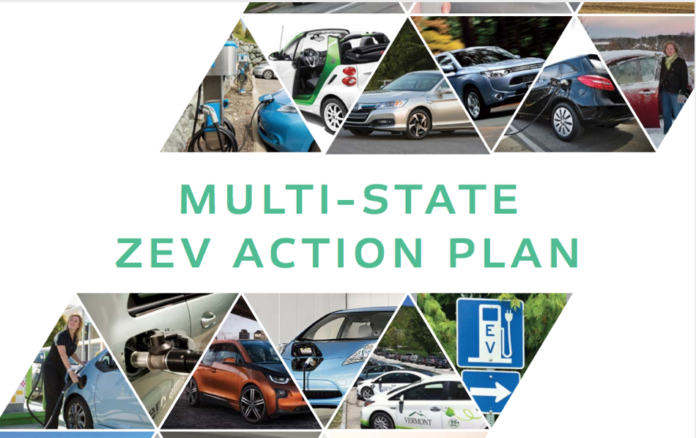Fifteen states and Washington, D.C., have entered a joint memorandum of understanding (MOU), committing to work collaboratively to advance and accelerate the market for electric medium- and heavy-duty vehicles, including large pickup trucks and vans, delivery trucks, box trucks, school and transit buses, and long-haul delivery trucks.
The goal is to ensure that 100% of all new medium- and heavy-duty vehicle sales be zero-emission vehicles by 2050, with an interim target of 30% zero-emission vehicle sales by 2030.
States signing the MOU are: California, Connecticut, Colorado, Hawaii, Maine, Maryland, Massachusetts, New Jersey, New York, North Carolina, Oregon, Pennsylvania, Rhode Island, Vermont and Washington.
“Now is the time to act regionally to protect the health of our residents and our climate by reducing emissions from medium- and heavy-duty trucks,” says Connecticut Governor Ned Lamont.
“In Connecticut, as in other states, our most vulnerable residents are hit hardest by the health effects of air pollution, including asthma and other respiratory ailments. I am looking forward to working with partner states through this agreement to leverage private sector ingenuity with smart public policy to transition to zero-emission vehicles,” he adds.
The MOU will go a long way toward slashing harmful diesel emissions and cutting carbon pollution. The transportation sector is the nation’s largest source of greenhouse gas emissions and also contributes to unhealthy levels of smog in many of the signatory states. Accelerating the electrification of trucks and buses is an essential step to achieve the deep economy-wide emission reductions needed to avoid the worst consequences of climate change and protect the health of millions of Americans. While trucks and buses only account for 4% of vehicles on the road, they are responsible for nearly 25% of total transportation sector greenhouse gas emissions. In fact, emissions from trucks are the fastest growing source of greenhouse gases, and the number of truck miles traveled on the nation’s roads is forecast to continue to grow significantly in the coming decades.
Truck and bus electrification also promises to deliver wide spread health benefits, particularly in communities with heavy truck traffic that are burdened with higher levels of air pollution. Medium- and heavy-duty trucks are a major source of harmful smog-forming pollution, particulate matter and air toxics. These emissions disproportionately impact low-income communities and communities of color often located near major trucking corridors, ports and distribution hubs.
The MOU comes at an important transition point for the industry as investment in zero-emission vehicle technology for the medium- and heavy-duty sector continues to ramp up. Today, at least 70 electric truck and bus models are on the market, and manufacturers are expected to make many more new models commercially available over the next decade. Apart from the public health benefits and avoided health care costs zero-emission trucks and buses provide, by 2030, the total cost of ownership for many common commercial vehicles is projected to reach parity with conventionally fueled vehicles.
To provide a framework and help coordinate state efforts to meet these goals, the signatory jurisdictions will work through the existing multi-state ZEV Task Force facilitated by the Northeast States for Coordinated Air Use Management (NESCAUM) to develop and implement a ZEV action plan for trucks and buses.
By promoting and investing in electric trucks and buses and the charging and fueling infrastructure needed to serve these vehicles, the signatory jurisdictions will support job creation, and help to build a resilient and clean economy.
Photo: The ZEV Task Force’s About Us web page




